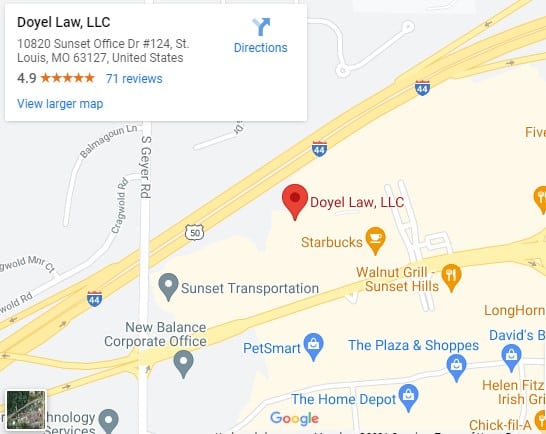When a loved one passes away and the probate process begins, working with our trusted probate attorney in Sunset Hills, MO is essential. If you are involved as an heir, the administrator of the estate, or an interested party, you should understand the probate law and its process in Missouri.
At Doyel Law, we strive to make the probate process as easy and smooth as possible. Contact our law office now and schedule an initial consultation with our qualified Missouri estate planning attorney to help you settle estates efficiently and reduce stress.
Why Do I Need a Probate Attorney in Missouri?
If you have recently lost a family member or a loved one, you are probably still grieving. As you deal with your loss, you must manage and settle their final affairs. Part of that includes probating the estate and distributing assets to the beneficiaries and heirs.
Probating an estate can be costly and may take a significant amount of time. However, the more you learn about probate, the more you can plan to speed up the probate process and even avoid it. Our credible Sunset Hills MO probate attorneys at Doyel Law can:
- Regularly assist clients with all types of probate cases and offer a wide range of estate planning services.
- Handle contested probate cases and probate litigation.
- Explain Missouri’s probate laws, answer your questions, and guide you through the process of administering probate estates.
- Provide legal advice to clients of all ages with the creation of a comprehensive estate plan.
- Help you deal with wills, trusts, asset protection, trust administration, probate litigation, and other estate planning needs.
- Provide efficient legal services for families in need of probate assistance in the state of Missouri.
Our legal team would be happy to help you and guide you through each step, from the opening of the estate to paying debts and distributing inheritances, to the closing of the estate. Contact us now and schedule an initial consultation with our Missouri estate planning attorneys.
What is Probate?
Probate is a legal process that takes place after someone dies. It is the first legal step to proving the last will and testament of the deceased is valid and genuine before the court of law. If the probate court deems the will to be valid, it will then supervise the distribution of property according to the terms of the will or state law. Our knowledgeable Sunset Hills probate lawyer can help you understand this type of legal procedure and what to expect.
The probate process helps you transfer your estate in an orderly and supervised manner. Probate also includes:
- identifying and inventorying the deceased person’s property
- having the property appraised
- paying debts and taxes
What Happens in Probate?
When a person dies, their assets are commonly reviewed by a probate court. This court provides the final ruling on the distribution and division of assets to beneficiaries. A probate proceeding will typically begin by analyzing whether or not the deceased person has provided a legalized will.
With or without a will, a deceased person’s estate must be settled and distributed. If there is a will, their estate is distributed according to their instructions once the will is shown to be valid. If the person dies without a will or is said to be intestate, their estate is distributed according to state laws of intestate succession. If you have questions about the probate process, our top-ranking Sunset Hills probate attorney can get the answers you need and guide you through the process.
Keep in mind that the probate process and timeline will vary depending on the state but, in general, probate law requires these steps:
Petition to Probate
To initiate the probate process, a petition for probate must be filed with a local probate court.
Swear In an Executor or Personal Representative
The person who will be working with the court during the probate process is the person named as executor in the will. If appointed by the deceased person’s will, the “executor” is empowered by “Letters Testamentary.” If appointed by the court, the “administrator” is empowered by “Letters of Administration.”
An executor or personal representative is responsible for locating, overseeing, handling, and distributing the estate of the deceased. Before doing so, they swear under oath to the court that they will distribute the decedent’s assets according to law.
Give Notice to Interested Parties
The executor has a legal duty to ensure that all creditors, beneficiaries, and heirs are notified that the estate has been submitted to probate. Before distributing assets to the beneficiaries, all creditors’ claims against the estate must be paid. Some states may also require you to publish a public notice in the newspaper. Failing to provide notice as required by law can create significant problems for the estate.
Determine the Value of the Estate
The next step in the probate process is for the personal representative to make an inventory and appraisal of all estate assets. An inventory should include real estate, personal property, stocks, bonds, bank accounts, retirement accounts, and more. Depending on the estate, this may be one of the most time-consuming responsibilities of a personal representative.
Pay Debts and Taxes
A decedent’s estate is responsible for their debts. It is crucial to review any outstanding bills and debts and decide how or whether they must be paid. Large estates may also be subject to the federal and state estate tax.
Distribute Remaining Assets
After paying estate taxes, debts, and claims, the personal representative or executor distributes the remaining assets to the beneficiaries named in your will. If there is no will, then your heirs receive distributions according to state intestacy laws.
Close the Estate
When the creditors’ claim period has passed, you’ve paid debts, filed all necessary tax returns, and settled any disputes, you’re ready to distribute the remaining property to the beneficiaries and close the estate. To close probate, the personal representative files a final accounting with the court. The final accounting reports all the assets of the estate, income generated on those assets, all debts paid, and distributions made to beneficiaries or heirs. Closing the estate releases you from your duties as executor.
What Goes Through Probate?
In certain circumstances, probate is required to ensure the legal transfer of assets from a decedent to the rightful heirs. Generally, property and assets that are only in your name are part of your probate estate. If you’re not sure whether or not you need probate, our skilled Sunset Hills MO probate lawyers are here to help you figure that out.
Examples of property or other assets that do go through probate are:
- Real property titled under your name
- Any bank, stock, financial account, or retirement account under your name
- Cars and vehicles titled under your name
When Is Probate Not Required?
Not all assets must undergo probate. Certain non-probate assets don’t need to go through the process. Non-probate assets are those held with other owners or with a named beneficiary. Since various factors may determine whether or not you need probate, our competent Sunset Hills MO probate lawyer can help you review and evaluate your assets.
Here are a few types of assets which are typically automatically transferred and therefore don’t need probate:
- Assets that include a payable-on-death (POD) or transfer-on-death (TOD) provision
- Jointly held or co-owned assets (Joint Ownership With Rights Of Survivorship)
- Bank and investment accounts with transfer-on-death beneficiaries
- Assets that already have a designated valid beneficiary (retirement accounts)
- Any property held in a living trust
- Lifetime gifts and distributions
- Life insurance and pensions with named beneficiaries
Call Our Seasoned Missouri Probate Attorney Now!
When a loved one passes away, the process of probating their assets can be confusing and intimidating. The grieving process of the family is often compounded by stress and uncertainty related to the legal work needed to settle the affairs of their deceased loved one. Family members are often unprepared for handling the legal and financial responsibilities after a loss.
The probate process is filled with potential pitfalls that can create unnecessary challenges. Navigating the probate process requires you to know and follow the rules and procedures in your state’s probate code. If you have never handled the probate of an estate before, our experienced Sunset Hills MO probate attorneys at Doyel Law are here to walk with you every step of the way. The more you know about probate, the more you can plan to streamline or avoid it.
Our estate planning law firm can help you and your family through the probate process in many county probate courts throughout Missouri. We also handle bankruptcy and family law cases. Let us provide valuable legal advice and assistance you need to protect you and the estate. Schedule an initial consultation with our skilled Missouri lawyers today.


